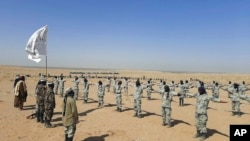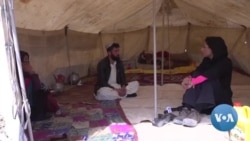The acting defense minister of Afghanistan's Taliban government has announced plans to build a 110,000-strong army for Afghanistan.
In his first television interview, Mullah Mohammad Yaqoob told Radio Television Afghanistan that the Taliban leadership has approved the plan for the building of the new army.
"The name registration for the new army has reached almost 80,000," Yaqoob said, adding that 10,000 army soldiers have already graduated from military training.
Since the Taliban seized power last August, the number of fighters in the group's ranks has not been independently confirmed.
Yaqoob, the eldest son of Taliban founder and former leader Mullah Mohammad Omar, who died several years ago, said "professional" Afghans who served in the former government and Afghans whom the previous government sent for military training abroad can also join the new army.
Human rights organizations, however, have accused the Taliban of persecuting and targeting former Afghan military and police personnel — charges that Yaqoob rejected.
The U.S. and its NATO allies spent more than $80 billion training and equipping Afghan national security forces over the past two decades, but the army and police disintegrated when U.S. forces left Afghanistan last year.
John Sopko, U.S. special inspector general for Afghanistan reconstruction, is expected to report to Congress next month on what happened to that equipment. Last week, he told VOA's Afghan service he was looking into reports that Taliban officials were selling the arms on the international market.
Taking stock
The Taliban's announced goal of creating a 110,000-person military comes as the group marks six months since they seized control of Afghanistan following the rapid collapse of the previous government as the final U.S. troops withdrew last August.
In the months since, the Taliban have changed Afghanistan in many ways, including its official name. So far, most of the changes have been seen as a return to the practices it embraced in the 1990s when the group was founded.
Widely reported as a repressive regime at odds with its own people and the rest of the world, the Taliban, some independent analysts say, have had one major achievement in the war-torn country.
"The biggest achievement of the interim (Taliban) government has been establishing security across most of Afghanistan," Graeme Smith, a consultant with the International Crisis Group, told VOA.
"There are serious information gaps, and we might not have all the necessary data about incidents, but it looks like the last six months have been less violent than any similar period in several decades," he added.
Before seizing power, Taliban fighters took part in thousands of attacks and clashes each year. At least 699 civilians were killed and 1,345 injured in Taliban attacks just in the first half of last year, the United Nations reported.
The United Nations now says security incidents have dropped by more than 90% since the Taliban took power.
“The number of security incidents fell significantly after 15 August, from 600 to fewer than 100 incidents per week. Available data indicate that armed clashes decreased by 98 per cent, from 7,430 to 148 incidents; air strikes by 99 per cent, from 501 to 3; detonations of improvised explosive devices by 91 per cent, from 1,118 to 101; and assassinations by 51 per cent, from 424 to 207,” the latest U.N. report on the situation in Afghanistan states.
Another metric, which measures how violence affects charities and nonprofit groups in Afghanistan, has also recorded a drop. In January 2021, the International NGO Safety Organization (INSO) reported 25 security incidents, with two nongovernment workers killed, eight wounded and three abducted. In January 2022, INSO reported 13 incidents and no deaths, injuries or abductions.
Afghanistan is still far from being a peaceful country. More than 500 Afghans, many of them from the religious Shiite minority, have died in attacks by Islamic State since August of last year, according to multiple reports.
From republic to emirate
Without calling for a referendum or elections after taking power, the Taliban immediately imposed an “Islamic emirate” to replace Afghanistan's constitutional republic system, which had been adopted in 2002 and was recognized worldwide.
Afghanistan's electoral bodies have been eliminated, women have been denied all civil and political rights, and the country's three-colored national flag has been replaced by the Taliban's white banner with the inscription "There is no God but Allah, and (the Prophet) Muhammad is the messenger."
Taliban leader Mullah Hibatullah Akhundzada is the ultimate authority on everything, including appointing government officials and judges, and deciding what rights should be given to women and minorities. Since taking power, Akhundzada has neither spoken to the nation nor appeared in public.
There is no clarity in the regime's accountability, said Mohammad Omar Zakhilwal, a former Afghan minister who met with Taliban leaders after the group seized Kabul.
"The current government in Afghanistan is not based on any particular constitution," Zakhilwal told VOA, adding that a constitution was needed as an element of legitimacy.
The group has also struggled to establish itself internationally. After six months in power, the Taliban still have not had their Islamic emirate formally recognized by any government.
"The Taliban's biggest mistake has been failing to find a way of cooperating with foreign countries," said Smith from the ICG.
Forming an inclusive government and respecting women's rights, particularly their rights to education and work, are some of the main conditions demanded by many before they recognize their government.
'Dark year'
The Taliban's return to power has been followed by a rapid economic collapse, a humanitarian crisis and an alarming worsening of human rights violations across Afghanistan.
An overwhelming majority of Afghans say their living conditions have worsened to the point where they say they are "suffering."
"2022 is going to be a very dark year for Afghan women," said Asila Wardak, a former Afghan diplomat who now lives in the U.S. because she was banned from work by the Taliban.
Extreme poverty and unemployment have forced many Afghan women into begging and even selling their body organs, according to several reports.
"Women are begging on the streets all over Afghanistan. Why can't they work in the offices?" Wardak said.
Taliban officials say by mid-March, schools and universities will be opened for girls and women, but the group has made no commitment on women's political rights and their return to work in the government.
Recognized or not, the Islamic Emirate of Afghanistan is the de facto government in Afghanistan. And while the country is facing intensifying economic, humanitarian and political crises, observers say there is little optimism for major changes in the foreseeable future.
"In the months ahead, I expect the Taliban to continue to defend their government as is, as inclusive enough, and show only minor flexibility in this regard," Zakhilwal said.







